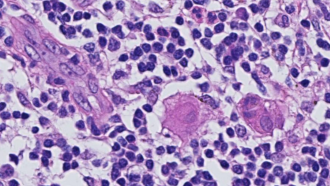-
Hope for treating autoimmune diseases
Clinical and Experimental Medicine
The Systemic Inflammation Index (SII) uses information from routine laboratory data to measure inflammation in the body and examining this index in a new way could provide vital answers for early diagnosis and management of a wide range of Read more about Hope for treating autoimmune diseases
Australia; SAFlinders University -
Chatbot guides women through post-prison challenges
International Journal of Communication
Researchers at the University of South Australia are co-designing a chatbot to help formerly incarcerated women re-establish their lives on the outside, and reduce the risk of them returning to prison. Most women leaving prison face profound Read more about Chatbot guides women through post-prison challenges
Australia; SAUniversity of South Australia|Seeds of Affinity -
DNA from carrion flies reveals which animals live nearby
Royal Society Open Science
DNA sampled from carrion flies can reveal which animals live in an area, according to Australian and international researchers. They captured 920 flies from within a zoo and along an area extending 4 km away from it. Sampling the DNA, they detected Read more about DNA from carrion flies reveals which animals live nearby
Australia; New Zealand; NSW; WACurtin University|University of Otago -
Honks and hisses: Why bossy goose behaviour pays off
Royal Society Open Science
Although agonistic interactions have previously been used to calculate individuals’ positions within a dominance hierarchy, to date the repeatability of agonistic behaviour has not been tested when calculating social rank. Aggressive greylag geese Read more about Honks and hisses: Why bossy goose behaviour pays off
Australia; International; SAFlinders University -
Sydney has grown like a tumour, spreading along transport lines
Journal of the Royal Society Interface
A model of the growth and spread of Sydney and London shows that these cities develop in a similar way to biological systems, like the way cancers grow with new blood vessels. They found an initial phase of limited growth around the city centre, Read more about Sydney has grown like a tumour, spreading along transport lines
Australia; International; NSWThe University of Sydney|University College London, UK, Ecole Polytechnique Federale de Lausanne, Switzerland -
A happy teen grows into a healthier adult
PLOS Medicine
Happy teens are more likely to be physically and mentally healthier in adulthood, according to international research. The team surveyed about 10,000 teens over the course of a year to measure how happy, hopeful and confident they were feeling, and Read more about A happy teen grows into a healthier adult
InternationalUniversity of British Columbia, Canada -
A baby's gut bugs develop similarly whether they're breast or formula-fed
Cell Host & Microbe
The bacteria in a baby's gut appears to develop similarly in the first couple of years of life whether they're breastfed or formula-fed, according to international research. The team collected poo samples from 210 babies at various points during Read more about A baby's gut bugs develop similarly whether they're breast or formula-fed
InternationalTechnical University of Munich, Germany -
Triple-negative breast cancer patients could avoid chemotherapy
JAMA
Peter Mac researchers are part of a major international study that has found patients with early-stage triple-negative breast cancer (TNBC) and high levels of immune cells could be spared from intensive chemotherapy regimens. Peter Mac researchers Read more about Triple-negative breast cancer patients could avoid chemotherapy
Australia; International; VICPeter MacCallum Cancer Centre -
Caution needed over screening scores for heart patients
JACC: Heart Failure
Existing non-invasive screening tools may miss heart failure amongst patients with atrial fibrillation (AF) and should be used with caution, according to the latest research. The warning follows a University of Adelaide study looking at the Read more about Caution needed over screening scores for heart patients
Australia; International; SAThe University of Adelaide -
Support for pill testing in the Northern Territory
Drugs: Education, Prevention and Policy
A new study led has uncovered strong support from Northern Territory (NT) festival goers, for drug checking (also known as pill testing) to reduce harm. Led by Menzies School of Health Research, this multi-institute, collaborative study provides Read more about Support for pill testing in the Northern Territory
Australia; NSW; VIC; WA; TAS; NTMenzies School of Health Research|Griffith University...










































